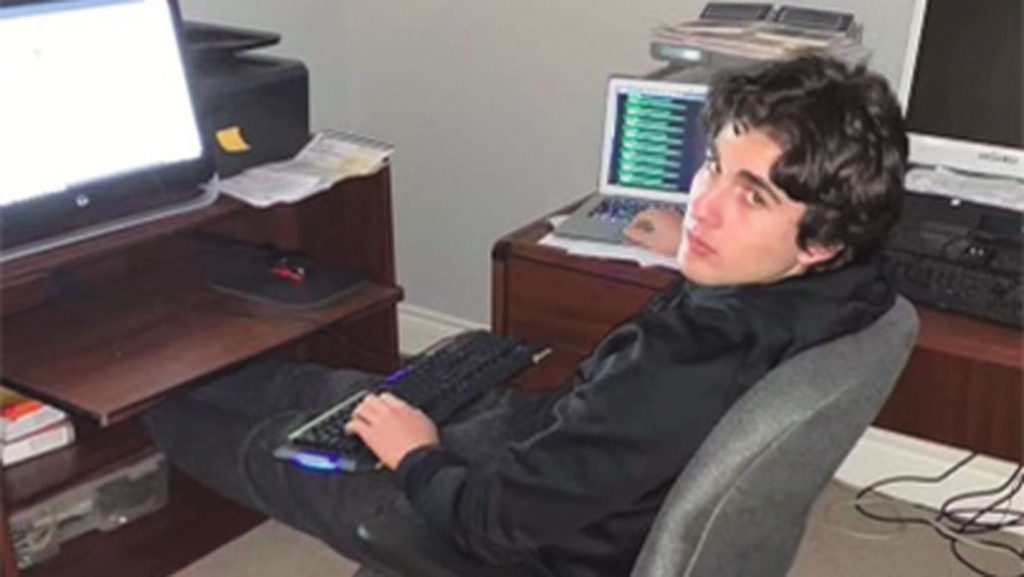
“We’re in,” says an excited Matthew Broderick to a devilishly curious Ally Sheedy after hacking into the “WOPR,” an AI-powered military supercomputer in the movie War Games. This is right before the machine asks, “Do you want to play global thermonuclear war?” It’s been 38 years since the release of that movie, but I’m certain that the phrase “we’re in” still triggers the same sort of devilish excitement today for the group of “hacker-thieves” using the latest technology to steal cars from Leaside driveways. To the rescue is newly minted Leaside High graduate Joshua A. Schiavone, founder of DoubleThreat Security & Engineering, a company focused on developing industry-standard cybersecurity tools used by professionals.
For the record, Josh is a “hacker” and although that term used to disturb him because of its seemingly degrading connotation, he has since come to terms with the moniker. Although hacking might not always be for malicious purposes, nowadays most references to the activity refer to unlawful activity by cybercriminals known as “black hat” hackers – who are motivated by financial gain, protest and information gathering (spying), and who use their powers for illicit activities. Conversely, Josh sees himself as a “white hat” hacker whose role is to protect and defend. With a good sense of market timing, Josh informed me that his current research is focused on “automotive security and the development of methods to combat the RF transmitters that unlock vehicles and have led to a record number of car hijackings in the past five years.”
Hacking is a growth industry
Josh’s passion for computers was evident at 11 years old. By 12 he was programming in C and has since added Python and C++ to his toolkit. He was quick to recognize the key role his parents played in his development by “going out of their way” to ensure he had access to increasingly challenging technical books and resources. Josh feels his interest in cybersecurity came from a natural curiosity and desire to “break” things and learn how to “fix” them. As an example, while playing with printers, he found a way to gain remote access because of weak security and subsequently trigger a printout on the local machine “with just a few lines of code!”
Exploits like these earned him a bit of local notoriety and led him to start DoubleThreat, sign his first commercial contract, and land him his current role as the cybersecurity and server administrator with Hackers For Change, a non-profit organization providing free cybersecurity solutions and offensive operations to charities which cannot afford the cost of protecting themselves. In the fall, Josh will attend Carleton University’s Computer Science program where he hopes to land a coveted internship with CSIS – Canada’s Security Intelligence Service.
Looking beyond the problem of stolen vehicles in our ’hood, the growing threat of cyber-attacks has made governments and industries more aware of the need to protect and defend the information and systems we rely on. As a result, cybersecurity is a rapidly growing discipline encompassing multiple specialities in science, mathematics, business, social sciences, and computing and engineering faculties. Typical jobs include ethical hacker, cybersecurity consultant, penetration tester/vulnerability analyst, cybersecurity analyst and chief information security officer. Demand from criminal hacking, state-sponsored players, corporations and individuals for cybersecurity professionals is expected to grow 30 per cent per year for the next 10 years, according to the U.S. Bureau of Labor Statistics. A recent study by Deloitte cited the need for 8,000 new positions in Canada over the next few years.
Let’s celebrate STEM with a Leaside-Thorncliffe Youth Hack-A-Thon
You can’t help being encouraged when you speak with young individuals in the community who are passionate about their future. Josh feels his enthusiasm for STEM subjects grew over time through a combination of hands-on experience fuelled by his curiosity, together with more formal programs such as RP4K (Real Programming for Kids) in Leaside along with computer engineering or computer science courses offered at Leaside High. More available options to access STEM-related activities and events would be welcome and he mentioned his desire to start the Leaside Cybersecurity community forum to facilitate connections.
The idea also came up during our conversation of running a local “Hack-A-Thon” this summer for interested youth in the Leaside and Thorncliffe communities as an experiment to gauge interest. The ultimate goal would be to connect individuals with a shared passion for STEM to a mentor system and support network so they can learn more about cybersecurity and related careers because there simply are not enough qualified cybersecurity professionals to meet the current demand.
Recognizing this as an opportunity, I reached out to Transform Services, a newly forming non-profit organization in Thorncliffe Park that plans to provide “a hand up to youth with barriers to employment by focusing on the basic training required to achieve the IT certifications necessary to build a career in cybersecurity.” Excitedly, the feedback about a possible collaboration to support the event is promising. Stay tuned Leaside-Thorncliffe, it’s time to get your “hack on” (yes, that’s a term).
Do you know someone who has been the victim of a cybercrime? Do you feel the passion for STEM subjects comes naturally, is based on “nurture,” or a combination of the two? Would you like to volunteer to support a Leaside-Thorncliffe Youth-Hack-A-Thon? Let us know at .


